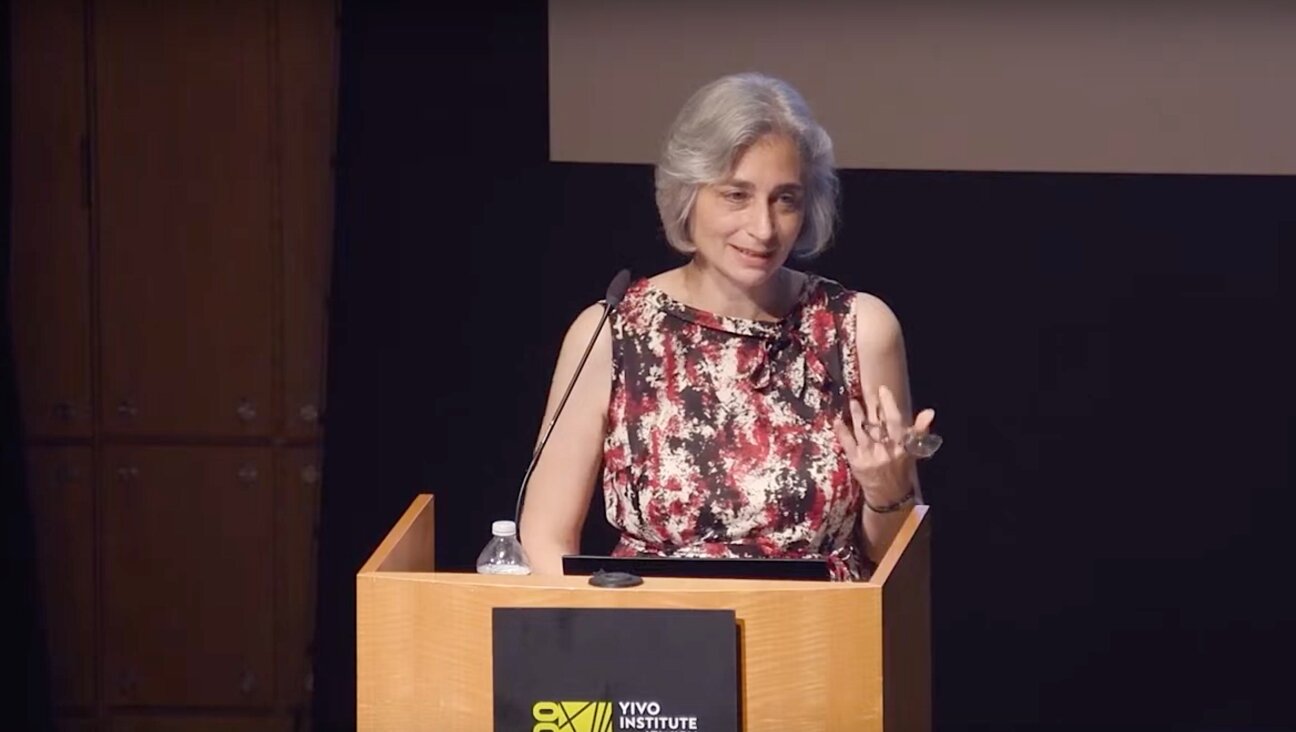ווידעאָ: קאָמיקער־זינגער פּסחקע בורשטיין זינגט וועגן אַ נײַעם טאַנץWATCH: Comedian-singer Pesach Burstein sings about a new dance
אַזוי ווי אַ סך לידער וועגן טענץ, ענדיקט זיך ניט אַלץ צום גוטן.

Image by Getty Images
די זינגערין און עטנאָמוזיקאָלאָגין דזשיין פּעפּלער שטעלט כּסדר אויף איר יוטוב־קאַנאַל אַלטע פֿאַרגעסענע לידער. לעצטנס האָב איך זיך דאָרטן אָנגעשטויסן אויף אַן אינטערעסאַנטער רעקאָרדירונג פֿונעם קאָמיקער און זינגער פּסחקע בורשטיינס אַ ליד, „לאַמצאַ דריצאַ אַ צאַ צאַ‟, וואָס דערציילט וועגן אַ נײַעם טאַנץ פֿון אַמעריקע. אַזוי ווי אַ סך ייִדישע לידער וועגן טענץ, זאָגט מען די הגדה און מע מיינט די קניידלעך. דאָס הייסט, מע זינגט וועגן טענץ אָבער ס׳איז צום טייל אַ מעטאַפֿאָר פֿאַר מער אינטימע באַציִונגען. בײַם סוף פֿונעם ליד דערציילט אַ מיידל דער מאַמען, אַז „עפּעס‟ איז שוין געשען, נאָר וואָס פֿאַר אַן „עפּעס‟ דאָס איז האָט מען, אַ פּנים, ניט געוואָלט אויסזאָגן.
די קאָמפּליצירטע מעטאַפֿאָרישע באַציִונגען בײַ ייִדן צווישן טענץ און סעקס ווערן דערמאָנט אין אַ סך וויצן, און די טעג אַפֿילו אין אַקאַדעמישע פֿאָרשונגען. אין איר מאָנאָגראַפֿיע וועגן טענץ אין דער ייִדישער ליטעראַטור, „עס קען דאָך פֿירן צו געמישטע טענץ‟, דערקלערט סאָניע גאָלאַנץ, אַ ליטעראַטור־פֿאָרשערין און ייִדיש־לערערין אינעם לאָנדאָנער „אוניווערסיטעט־קאַלעדזש‟, אַז טענץ איז בײַ ייִדן געווען אַ סימבאָל פֿאַר אַלע מינים צרות, בפֿרט אין צײַטן ווען די קולטור האָט זיך געהאַלטן אין איין בײַטן. אַזוי ווי אין בורשטיינס ליד, וווּ מע זינגט וועגן אַ טענצל אַנשטאָט סעקס, האָט מען אין דער ייִדישער ליטעראַטור אָפֿט דערמאָנט די סכּנה פֿון געמישטע טענץ ווען מע האָט באמת מורא געהאַט פֿאַר אַנדערע געפֿאַרן ווי די השׂכּלה, רדיפֿות קעגן ייִדן, באַציִונגען צווישן די דורות, וכדומה.
אינטערעסאַנט איז וואָס די מוזיק צו „לאַמצאַ דריצאַ אַ צאַ צאַ‟ האָט אַזאַ אָפּטימיסטישן טאָן און איז ענלעך צו אַ מיליטערישן מאַרש. ס׳איז ניט דאָס איינציקע ליד מיט מונטערער מוזיק און צוויי־טײַטשיקע שורות. ענלעכע לידער אַזעלכע זענען „הו צאַ צאַ‟ און אַ צאָל לידער פֿון אַהרן לעבעדעף, וואָס זענען כּלומרשט וועגן עסן אָבער באמת וועגן גאָר אַן אַנדער טעמע.






















